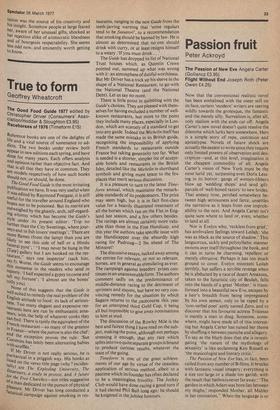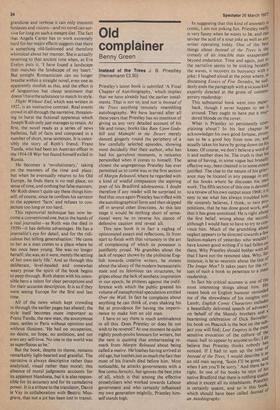Passion fruit
Peter Ackroyd
The Passion of New Eve Angela Carter (Gollancz £3.95) Flight Without End Joseph Roth (Peter Owen £4.25)
Now that the conventional realistic novel has been embalmed with the sneer still on its face, certain 'modern' writers are veering wildly towards the grotesque, the fantastic and the merely silly. Surrealism is, after all, only realism with the ends cut off. Angela Carter's new novel doesn't quite resolve the dilemrha which lurks here somewhere. Hers is a simple story of rape, castration and apocalypse. Novels of future shock are actually the easiest to write since they require only limited powers of observation and description—and, at this level, imagination is the cheapest commodity of all. Angela Carter's vision of New York must be the most lurid yet, surpassing even Doris Lessing in its horror: gangs of women-libbers blow up 'wedding shops' and send giftparcels of 'well-honed razors' to new brides. That uneasy tone, perched somewhere between high seriousness and farce, unsettles the narrative as it leaps from one improbability to the next. And Angela Carter isn't quite sure where to land or, even, whether to land at all.
Nor is Evelyn who, 'reckless from grief,' has ambivalent feelings toward Leilah: 'she was as black as the source of shadow.' This languorous, sickly and polysyllabic manner swoons over itself throughout the book, and it can in turns be charming, repellent or merely obtrusive. Perhaps it has too much ground to cover. Evelyn mistreats Leilah terribly, but suffers a terrible revenge when he is abducted by a race of desert Amazons, taken to the futuristic city of Beulah, falls into the hands of a great 'Mother,' is transformed into a beautiful new Eve, escapes by a hair's breadth from being impregnated by his own semen, only to be raped by a 'non-verbal poet' aptly named Zero, and to discover that his favourite actress Tristessa is merely a man in drag. Someone, somewhere, might have made all of this interesting but Angela Carter has ruined her theme by shuffling it between pastiche and allegory. To say as the blurb does that she is investigating 'the nature of the mythology of sexuality' is like acclaiming Ken Russell as 'the musicologist and literary critic.'
The Passion of New Eve has, in fact, been culled from any number of B-films. It bristles
with fantastic visual imagery ; everything is a size too large or a shade too garish, with the result that bathos is never faraway: "The garden in which Adam was born lies between my thighs,' responded Mother, all Mahler in her intonation." When the language is so grandiose and verbose it can only transmit fantasies and visions—and no novel can survive for long on such a meagre diet. The fact that Angela Carter has to work extremely hard for her major effects suggests that there is something old-fashioned and therefore whimsical about her manner. She is actually reverting to that ancient time when, as Eve Evelyn puts it, '1 have found a landscape that matches the landscape of my heart.' But straight Romanticism can no longer breathe within a straight novel, even one as apparently modish as this, and the effect is of languorous but cheap sentiment that doesn't have thesubstance to match its style.
Flight Without End, which was written in 1927, is an instructive contrast. Real events crowd in all through the narrative, threatening to burst the fictional apparatus which Joseph Roth only just manages to retain. At first, the novel reads as a series of news bulletins, full of facts and composed in a number of short, terse sentences. It is ostensibly the story of Roth's friend, Franz Tunda, who had been an Austrian officer in the 1914-18 War but found himself exiled in Russia.
He becomes a 'revolutionary,' taking on the manners of the time and place; but when he eventually returns to his Old Europe, he finds there is no real place, no sense of time, and nothing but false manners. Mr Roth doesn't quite say these things himself, of course, since he confines his narrator to the apparent 'facts' and refuses to conjecture too long or too hard.
This reportorial technique has now become a conventional one, but in the hands of a real journalist—as Roth was (he died in 1939)—it has definite advantages. He has a journalist's eye for detail, and for the ridiculous but telling generalisation: 'He came to her as a man comes to a place where he has once been young. She was no longer herself; she was, as it were, merely the setting of her own early life.' And so through this deliberate, level-headed and somewhat weary prose the spirit of the book begins to peep through. Roth shares with his ostensible hero a talent for clear perceptions and for their accurate description. It is as if they were seeing Europe for the first and last time.
All of the news which kept crowding in through the earlier pages has abated; the style itself becomes more important as Franz Tunda, the new man, the anonymous man, settles in Paris without opinions and without illusions. 'He had no occupation, no desire, no hope, no ambition, and not even any self-love. No one in the world was as superfluous as he.'
But the book, despite its theme, remains remarkably light-hearted and graceful. The narrative is always descriptive rather than analytical, visual rather than moral; this absence of moral judgments accounts for its apparent blandness, but it is also responsible for its accuracy and for its cumulative power. It is a tribute to the translator, David le Vay in collaboration with Beatric Musgrave, that not a jot has been lost in transit.



































 Previous page
Previous page